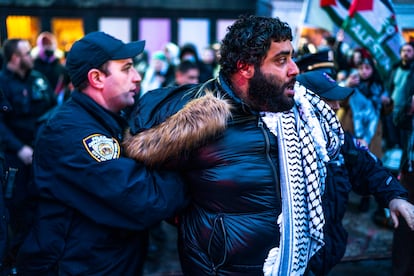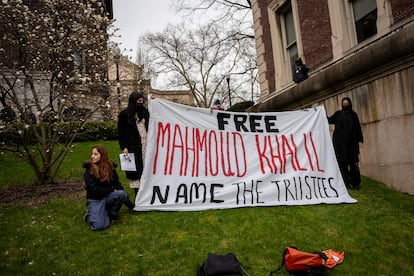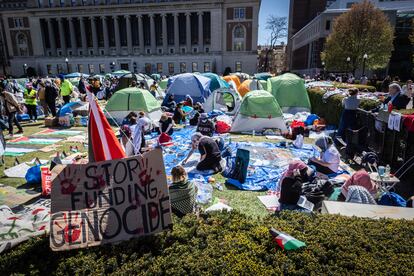US university campuses hit by antisemitism inquisition
Pro-Palestinian students are being harassed and reported as Trump targets university funding


One aspect of the witch hunt on U.S. campuses is called doxxing, which refers to the act of revealing an individual’s personal information in order to intimidate, threaten or harass them. In other words, it is an inquisition that targets those who have raised their voices against Israel’s merciless bombardment of Gaza since October 2023. Although the Trump administration is now leading this offensive, it was going on months before the Republican won the U.S. elections with all those who criticized Israel being accused of antisemitism. Behind each of the names of the dozen or so foreign students arrested since March 8, 2025, there is an organization, a vigilante or a facial recognition software program working to unmask masked demonstrators. The doxxing machine has served its targets to the White House on a platter.
Consisting of the disclosure of sensitive data, including telephone, address, e-mail and very often photographs, the doxxing phenomenon first hit campuses as early as the end of October 2023 in response to the first timid anti-Israel protests that would go on to become the largest student mobilization in the U.S. since Vietnam. Vans with LED light panels displayed lists with names and surnames and photos of students and professors accused of sympathizing with Palestine, or being members of terrorist organizations. Vans with the image of Harvard’s president, Claudine Gay, and the slogan “unfit for office,” drove morning and night through the streets of Cambridge, Massachusetts, or parked in front of her home.
The same was true of the president of the University of Pennsylvania, Liz Magill, who was crucified like Gay before Congress where Republicans upbraided them for not serving up a more robust response to the incipient pro-Palestinian protests. The pressure caused them to resign, after which two Columbia presidents resigned, but the worst was yet to come; the Trump administration launched a manhunt against the students, but also against the universities themselves. Five, the last of them Brown, are being threatened by Washington with the cancellation of millions in federal grants if they do not eradicate all anti-Israel speech, in addition to suppressing their diversity programs.
“The widespread persecution of students and faculty for speaking out on Palestinian human rights is unlike anything we’ve seen so far,” said a former Columbia professor on the condition of anonymity. “Students have been repeatedly singled out in public, accused of antisemitism, physically attacked, hauled before secret disciplinary hearings, arrested and now threatened with detention and deportation, all for calling for an end to the mass killings in Gaza. [Columbia] University and the Trump administration have made it clear that there is no freedom of speech about Palestine and that activism will be severely punished.”
Two overlapping dynamics — the campaign of harassment on the ground and the White House offensive from above — threaten to stifle freedom of expression in places where debate and the formation of ideas should thrive. There is fear among the student body, but also within the faculty. Teachers of sensitive departments, such as Middle East studies or the Center for Palestine Studies at Columbia find themselves particularly vulnerable to Trump’s White House, which has imposed a special vice-chancellor to supervise its syllabus. Both have closed the contact details tab of their official websites. Few were prepared to give a statement.

Foreign students fear for their visas. “Don’t even think of asking students with Arab features to speak. Silence has been imposed in order to survive,” says a European student in the vicinity of Columbia, which closed access to its campus to anyone not directly associated with the university. “We all want to finish our studies and that’s why it’s best to keep a low profile. Those who participated in the protests last year are the most fearful, especially because of the facial recognition software that reveals your features, even if you had your face covered during the protest. All of us, and I include myself, have deleted 90% of the posts on our social media,” he adds.
Secretary of State Marco Rubio announced in March the screening of online postings by students under suspicion using an artificial intelligence tool. Wielding the power to revoke visas and deport under a 1952 law, Rubio has also ordered embassies to scrutinize the social media posts of student visa applicants, to weed out any who have criticized Israel or the U.S.
“These campaigns are attempts to intimidate and harass and have the effect of killing free speech,” says Isaac Kamola, director of the Center for the Defense of Academic Freedom at the American Association of University Professors (AAUP). “Right now, the full force of the federal government is being used to punish students and faculty members who criticize the Trump administration or express support for Palestine. This federal crackdown from above comes hand in hand with online harassment and doxxing from below, making it very risky to speak out in public, especially for foreign students and professors.”
Schism in the Jewish community
Callen, a Jewish doctoral student and adjunct professor, was a direct victim of doxxing in late October 2023. She was tearing down posters with images of Hamas hostages — a massive campaign that adorned the streets of New York, and still does — when she was filmed by two individuals. “The posters contained misleading and erroneous information, and I started taking them down,” she says. “They were in a public place. And then two people came up to me and started yelling at me, filming me, messing with me. We had a few words and I left. A few days later, I started receiving death threats by email. And then I was featured on a Fox News segment and in a bunch of articles. That got me in trouble with the faculty and I got fired from CUNY [the public university in New York], but things have continued to happen to me, and I don’t even have social media,” says Callen. The schism in the Jewish community between supporters and critics of the Israeli military offensive is becoming increasingly pronounced.
Callen only learned later that she had been the victim of doxxing by one of the most active harassment groups, Canary Mission, which has not responded to this newspaper’s request for comment. “Now we know who they are, who is behind it, but it happened to me before we knew what they were doing,” she adds, stressing that the offensive has been systematized and become more aggressive since. “I am not the only one. There are many people who have been targeted. I’m working to document [attacks] and make it easier for other people this is happening to.”
Callen got a job at another education center and is working on her PhD. “What’s going on is scary, but I’m a [U.S.] citizen, so I’m not in the same situation as others. And I think it’s up to people who are privileged like me to speak up about these things so that those who are in a more precarious situation don’t have to. And I’m Jewish, so I’m also very affected by genocide. But I don’t think my fear is more important than the situation and the importance of denouncing what is happening in Gaza.”
Impunity and boasting
One thing that defines the actions of all those who use doxxing to inform on suspects is their complete impunity, if not boastfulness. While whistleblowers usually make a point of keeping their identity under wraps, this time the opposite is true. Gregg Roman, executive director of the Middle East Forum (MEF), admits that it was his organization that identified Badar Khan Suri, an Indian citizen married to a Palestinian, who was studying and teaching at Georgetown University, and who was arrested at the end of May. An MEF article had shortly before exposed his identity and the allegation against him: his wife is the daughter of a deceased Hamas leader.
“The Middle East Forum’s Campus Watch project has singled out the Georgetown researcher as part of our effort to document scholars who, in our view, whitewash extremism and lend legitimacy to anti-Israel or pro-Hamas rhetoric,” Roman explains. “Our goal is not simply to defend U.S. interests but, in a broader sense, to maintain academic integrity in Middle East studies, uphold standards of scholarship, and ensure that extremist ideologies are not promoted in university classrooms.”
Furthermore, Roman uses his email to attach a list of the names of five academics, some of them highly regarded, in the field of Middle East studies as potential targets, and refers to the website of the organization that harassed Callen for an updated list of those targeted. “We call them pro-Hamas and anti-Israel protests, which more accurately describes the sentiment of their participants,” Roman explains, adding that the individuals on his list have “ties to terrorist organizations and/or individuals and have proven to be apologists for those organizations/individuals and their actions.” The same argument is made by the White House, which has accused the detainees of being associated with Hamas or Hezbollah, without producing any evidence.
Kamola talks about the havoc Trump’s inquisition is wreaking on campuses: “The detention, illegal deportation, cancellation of visas and denial of entry to students and faculty constitute an existential threat to academic freedom,” he says, citing the well-known cases of Columbia postgraduate Mahmoud Khalil, to date the most politically high-profile example “and a harrowing precursor of what will follow.” Then there is Brown University professor Rasha Alawieh, “deported, despite a court order blocking her expulsion.” And Turkish doctoral student Rumeysa Ozturk, at Tufts University, “kidnapped by masked officials.” These are just some of the cases in which Kamola sees “a clear message that the administration will use the full force of the federal government, without checks and balances, to punish students and academics it considers enemies of the state, often because of their defense of Palestine.”

A graduate studies coordinator at a university who asks not to be identified flags up how difficult it is to criticize, let alone reverse, this state of affairs. “As we are seeing, there is little that can be done if someone is arrested for their views on Palestine,” he explains, noting that the presumption of innocence is another victim in this bloodless war. “Current actions, such as doxxing and the termination of student visas and green cards for students and professors, have been based on pressures exerted since October 2023 through groups such as Canary Mission.” This, combined with “heavy escalation by the federal, state and local governments, has led to a crackdown on the ability of students and faculty to express their views on the question of Palestine, as well as the ability of research centers, departments, faculty and students to conduct research and organize public events on Palestine for fear of reprisals.”
The professor stresses that his university’s main concern is for the safety of foreign students and professors: “Now we have to worry about them staying in the country or traveling abroad to visit family, attend conferences or conduct research, since their re-entry may be difficult.”
One of the individuals who most zealously denounced alleged antisemitic demonstrations on his campus — with such ardor that the university temporarily suspended him — is the Israeli Columbia professor Shai Davidai. “While I have absolutely nothing to do with the possible deportation of these students, I am somewhat relieved to see them face the consequences of their actions,” he said. “However, we must ensure that all of them have due process and can defend themselves before a judge. Since some of the cases, such as Mahmoud Khalil’s, are clear violations of the conditions for permanent residency in the U.S., I am sure they will end up being deported.”
Meanwhile, Khalil, who is still being held in a Louisiana facility and whose deportation proceedings have been blocked by a judge, has had no charges filed against him to substantiate the White House’s allegations of his alignment with Hamas.
As the guinea pig for the Republican crusade to suppress all speech critical of Israel, Columbia University adopted a policy against doxxing and online harassment last month, although it will not be applied retroactively, meaning that previous incidents will not be reportable. For many, it is too little too late, because the death of both academic freedom and the presumption of innocence is the price universities are being forced to pay in order to continue to receive federal funding.
Sign up for our weekly newsletter to get more English-language news coverage from EL PAÍS USA Edition
Tu suscripción se está usando en otro dispositivo
¿Quieres añadir otro usuario a tu suscripción?
Si continúas leyendo en este dispositivo, no se podrá leer en el otro.
FlechaTu suscripción se está usando en otro dispositivo y solo puedes acceder a EL PAÍS desde un dispositivo a la vez.
Si quieres compartir tu cuenta, cambia tu suscripción a la modalidad Premium, así podrás añadir otro usuario. Cada uno accederá con su propia cuenta de email, lo que os permitirá personalizar vuestra experiencia en EL PAÍS.
¿Tienes una suscripción de empresa? Accede aquí para contratar más cuentas.
En el caso de no saber quién está usando tu cuenta, te recomendamos cambiar tu contraseña aquí.
Si decides continuar compartiendo tu cuenta, este mensaje se mostrará en tu dispositivo y en el de la otra persona que está usando tu cuenta de forma indefinida, afectando a tu experiencia de lectura. Puedes consultar aquí los términos y condiciones de la suscripción digital.








































